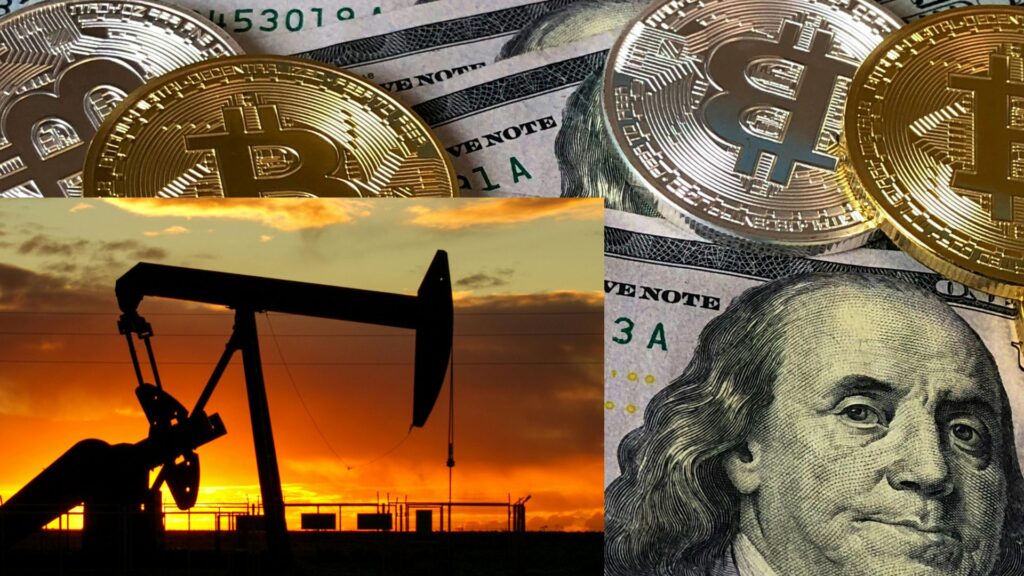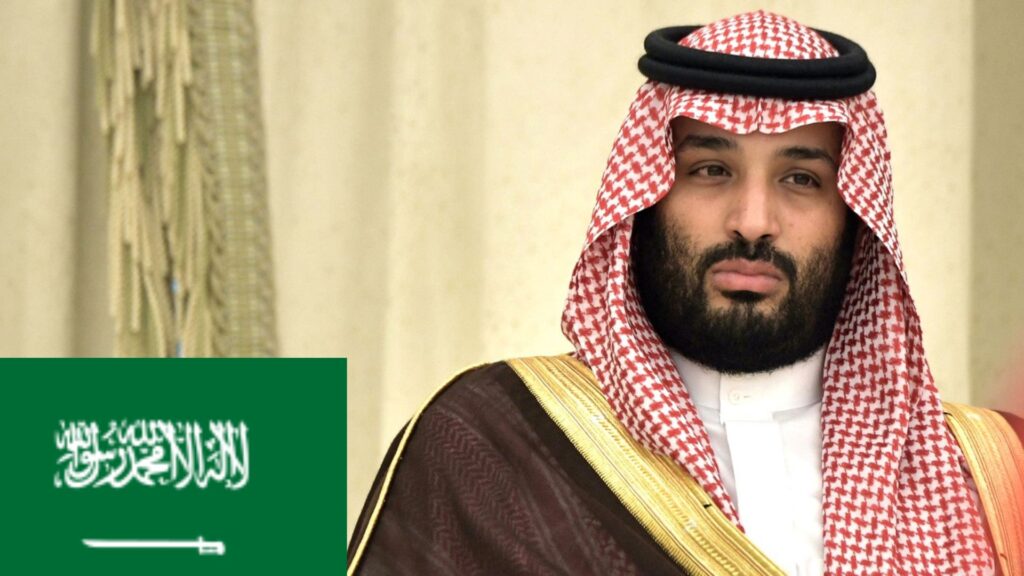
Readers like you help support Lifespectrum360.com. When you purchase using links on our site, we may earn an affiliate commission. Read More.
Economic Earthquake: Petrodollar Collapse and What Comes Next
Recently, a crucial event happened because of which the word “Petrodollar” reached its highest level of popularity in Google search results. What is the event? Saudi Arabia decided not to renew the contract of cooperation signed on 08th June 1974 between the United States and Saudi Arabia. Many experts said this would lead to the Petrodollar collapse. Some said this is fake news. We deep-dived into facts and also analyzed what could be the impact on the global economy.
What was the co-operation deal?
On 08th June 1974, the then secretary of state of the US, Henry Kissinger, and the second deputy premier of Saudi Arabia, Prince Fahd Bin Abdul Aziz signed the agreement. Since then, both countries have renewed the agreement every five years.
As per the cooperation agreement, two commissions were set up. One to look into Saudi Arabia’s military needs exclusively, and the other will look into all other areas such as advanced technologies like solar energy, the education system, agriculture, and the upgradation of the financial system. It was a deal where all help was assured from the US to Saudi Arabia for her economic development. However, the agreement DID NOT mention the word “Oil“. There was no compulsion on Saudi Arabia’s side to purchase her requirements only from the US.
It was a deal of cooperation, not compulsion.
Why did US sign a deal where all co-operation was assured from US side?
The agreement was an economic deal. While the US provided help in technology, military, and education, Saudi paid back the bill in Dollars. The more assistance the US provided to Saudi, the more dollars Saudi required to pay for the bill, obviously in USD ( the universal currency code for the United States Dollar). This payment obligation created a continuous demand from Saudi Arabia for USD. Since most of the nations are oil importing like India, Europe, the UK, and China, and Saudi Arabia being the largest oil exporter globally (She commands 16.7% market share of global crude oil exports), the oil importing countries continuously sought USD to pay for their Oil bill to Saudi. Other major oil exporting countries like Iran, Iraq, Kuwait, and UAE also moved to invoice the majority of their oil sales in the greenback (another name for USD).
Not only did Saudi Arabia pay the bill for all the economic help it received from the United States, but she also invested the surplus proceeds from oil sales in US treasury bonds. This exercise created a continuous demand for US treasury bonds and gave flexibility to the US to issue as many bonds as possible.
A new term, “Petrodollar’ or “Saudi Arabia Petrodollar” came up to represent the demand of USD to foot the Oil bill of the oil-importing countries. The Petrodollar ensured the global acceptance of the USD, and thus, the USD became the world’s reserve currency. The pact with Saudi Arabia put the US at the pole position in the world financial markets.
Why did saudi arabia decided not to renew this pact?
In today’s world, where almost all countries are closely interconnected, science and technological know-how are not limited to one or two countries alone. Every country depends on another for some or the other reason. What used to be a close secret of American success, advanced technology is no longer a secret. Saudi Arabia has made significant progress over the years in technology and education. Today, once fully import-dependent, Saudi Arabia exports agricultural products like wheat, dates, dairy products, eggs, fish, poultry, fruits, vegetables, and flowers to the world using advanced techniques like precision agriculture, hydroponics, and desalination.
Saudi Arabia’s advancements in the energy sector have been phenomenal in recent times. She has started the process of commissioning its largest renewable (Solar) power project for 3.7 Giga Watt. It is coming on the back of the recent launch of another mega renewable power project for 2.6 GW. The world’s largest green hydrogen project of 4GW is also in the pipeline to be commissioned in Saudi Arabia.
Saudi Arabia is making a lot of push to modernize its banking infrastructure. Online banking penetration is increasing and has reached more than 50%. Commercial banks have healthier balance sheets, and 70% of their revenue comes from commissions, which are stable income. Banks are now open to adopting modern technologies like digital payments and CBDC (Central Bank Digital Currency, a blockchain technology-enabled payment mechanism).
As per the Saudi Embassy publication, the Kingdom’s literacy rate is more than 90% for men and 70% for women. The skew in favor of men is a cultural legacy. Even at a 70% literacy rate for women, Saudi Arabia is ahead of many emerging and culturally open countries. However, things are changing on the ground to make the country more open for women. Certainly, this number will change shortly as per the recent trends. The literacy rate among children under 15 (who are becoming adults a few years from now) is 89.2% for boys and 93.2% for girls.
Saudi Arabia provides free healthcare services to citizens. She is among the top 26 countries globally to provide high-quality healthcare. A 100-square-meter home in Saudi Arabia costs around 4.5 years of the average annual salary of a person, and the country is the most affordable to buy a home. In the United States, an average house costs six years of the average annual salary of a person. A person can afford a home with less financial burden in Saudi Arabia than in the United States.
These facts suggest that Saudi Arabia has less economic dependency on the United States today than 50 years ago.
Are these only reasons why saudi arabia moved away from this pact?

Saudi prince Mohammed Bin Salman
No. The factors discussed above are not the only ones that made Saudi Arabia prefer moving away from the pact and silently agree to petrodollar collapse. There are geopolitical angles to it. In recent times, especially after the Ukraine war broke out, the US froze Russian assets. How would a country react whose years of hard-earned money is snatched in a moment? It will be disastrous for any country. This is what happened in Russia’s case. Russia has been selling petroleum products in USD over the years, and after the US froze Russian assets close to $67 Billion, all of the accumulated earnings over the years became unuseful for Russia. It was painful. Other oil exporting countries were alerted about the United States’s weaponization of the Dollar. What happened to Russia can also happen to them anytime. Saudi Arabia is the largest oil exporter, and most of her reserves denominated in USD (close to $ 600 Billion), sensed the weaponization of the Dollar as a threat.
There is another economic factor, the China angle. Of late, relationships between the US and China have not been good. The US is the largest oil producer now and is not a market for Saudi Arabia’s oil anymore. However, China is the go-to-market for Saudi Arabia. China is the most populated country on the planet and will have a huge demand for oil in the future. Saudi Arabia has to increase its cooperation with China for its long-term interests.
is it a definite petrodollar collapse?
No. Even if Saudi Arabia does not renew the agreement, it does not mean Saudi will stop accepting USD as a currency for its exports. At least officially, she has not declared anything like this. But She will also accept other currencies for payments, and it will not be in the order of 1-2%, it may be 10-20% of Saudi Arabia’s oil basket. However, alternative currencies like the Chinese Yuan or Japanese Yen are not immune from extreme government intervention. Therefore, the question is – “How can the alternate currencies be 100% trusted”?
Also, when EUR (currency for 20 European nations) came into existence, it was projected to be an alternative to USD as a reserve currency for the world. However, this theory has hit a dead end now. So Saudi Arabia and other oil exporting countries cannot afford to completely shift away from USD. Therefore, It’s not a granted position that petrodollar collapse is inevitable.
However, even a 10-20% decline in the Dollar-denominated oil sales by Saudi Arabia will make other oil exporting countries like Iraq, Kuwait, and the United Arab Emirates think along similar lines. Currently, the Dollar-denominated global oil trade is around $ 5.3 Trillion. A 10% decline in this value will mean a massive $ 530 Billion decline in demand for the greenback. The rippling effect of Saudi Arabia moving away from the petrodollar will accelerate petrodollar collapse and global economic earthquake.
what is for the united states?
Since Saudi Arabia’s decision to move away from the cooperation pact will not cause an immediate petrodollar collapse, the US has the time to work out an amicable solution. They should be working towards strengthening relationships with Saudi Arabia and other major oil exporting countries and offer real value on the table. It could be more military aid for example.

Another aspect where the US should focus is to stop weaponizing the USD currency. All countries should see the US as a friend of all seasons.
The third aspect is to STOP unlimited printing of dollars. If the US continues to print dollars at this rate, the countries who hold US treasuries will cry. The value of their holdings will depreciate. No country wants to be penalized for none of their faults.
The fourth aspect is to have a moderate interest rate so that the economy will thrive. A thriving US economy will always keep the economies of the rest of the world engaged with it.
what lies ahead if i am a uS investor?
If I am a US investor, I will worry about inflation going up or will become sticky in the medium to long term. This higher-than-expected inflation would mean a possible delay in cutting the interest rate cycle. Borrowing costs will remain high for some more time. Higher borrowing costs will make businesses uncompetitive to operate in the US. Consumer spending will slow down. Housing purchases will fall with higher mortgage costs. The economy will suffer, and so will the equity and bond markets.
However, if the US can reassure Saudi Arabia and other top oil exporting countries, the situation can come back to normal. US’s position will be clear in a couple of months. Until then, investors should keep a close eye on the events.
what lies ahead if i am a Non-uS investor?
If things do not go in US way and US economy suffers, it will be bad for the world economy, because US is closely related with all the major economies. So, even if I am a non-US investor, I will be closely watching the events keeping my fingers crossed.
Let me know what do you think.
Data Sources : Bloomberg, Reuters, New York Times, Statista, Saudi Embassy, Power Technology, Wikipedia, sustg.
Refer our Next Gen Personal Finance page to access the news, analysis and tools that matter for your financial well being. If you have any suggestion on the article “Economic Earthquake: Petrodollar Collapse and What Comes Next”, please send to contact@lifespectrum360.com.
Disclaimer: This article is the personal opinion of the author. The information in the article is generic and not tailored to specific situations of individuals. Therefore, the article is for informational purposes only and not intended to be personal financial advice or any kind of recommendation. Readers should understand that there is an inherent risk involved with financial decisions and should consult financial advisors for help with any investment advice. Neither the author nor Lifespectrum360.com is liable for the decisions readers make.

Birendra Sahu
Birendra is a seasoned finance professional with over two decades of expertise in the financial industry. He has experience in several multinational banks in both operations and technology. His areas of expertise are Investment Banking, Asset and Wealth Management, Treasury and Risk Management.
FAQ
The petrodollar refers to the US dollars earned by countries through the sale of their oil. This system originated in the 1970s when oil-producing countries agreed to price their oil in US dollars, effectively tying global oil markets to the American currency.
The petrodollar collapse refers to the potential breakdown of this system, where oil-producing countries might stop using the U.S. dollar for oil transactions. This could lead to significant shifts in global economic and financial systems.
Several factors could lead to the collapse of the petrodollar, including Saudi Arabia deciding not to renew the 50 year old co-operation agreement with the US, the emergence of alternative currencies like Chinese Yuan, alternative payment and settlement mechanisms like mBridge, changes in global oil supply and demand scenario, and the adoption of renewable energy sources reducing dependency on oil.
A petrodollar collapse could lead to:
- Reduced demand for U.S. dollars, impacting its value and causing inflation in the U.S.
- Increased volatility in global financial markets.
- Shift in economic power towards other currencies such as the Chinese Yuan or Japanese Yen.
- Changes in global trade dynamics.
The U.S. could face significant economic challenges, including:
- A weaker dollar, leading to higher import costs and inflation.
- Increased interest rates as the U.S. government might need to offer higher returns to attract foreign investment.
- Potential reduction in global economic influence.
Countries can prepare by:
- Diversifying their foreign currency reserves.
- Strengthening economic ties with multiple trade partners.
- Investing in renewable energy and technology.
- Enhancing their financial regulatory frameworks to manage potential market volatility.
After a petrodollar collapse, the global financial system might see:
- A multipolar currency system with multiple strong currencies.
- Increased use of digital currencies and blockchain technology.
- Shifts in geopolitical alliances as countries adapt to new economic realities.
While not inevitable, the petrodollar system faces significant pressures from evolving geopolitical, economic, and technological factors. Proactive measures and adaptability could mitigate the risks and impacts associated with such a collapse.
4 thoughts on “Petrodollar Collapse: What lies ahead for investors?”
Hello Birendra Ji…
What a wonderful article!👏👏 It is both enticing and thought-provoking💭💭. Please continue writing such insightful pieces; we are eager to follow your work👌👌🙏🙏
Best,
Ramesh Gupta
Thank you Ramesh.
Hi Birendra
The contents of this article are crystal clear and provides insight into the Oil Economy, Economic muscle power and Changing landscape of international business.
Thank you Manoj.